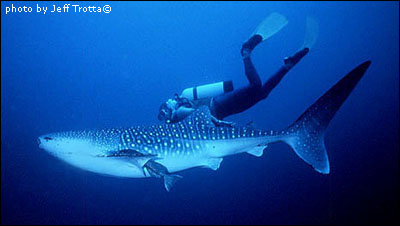WHALE SHARK IMPORTANCE TO HUMANS
In the past, the whale shark has been of little interest to man. At present, commercial fisheries for whale sharks are limited, but may expand from an increased demand for food products. In Taiwan approximately 100 whale sharks are taken annually. The whale shark meat fetches a high price in this country, and this fact has stimulated larger harvests over the last years.

Fishing for this shark also occurs in the Philippines, particularly in the Visayas and Mindanao areas, providing food for the local fishing communities. Whale shark fins are sold in the Orient, especially in the Hong Kong. Occasionally whale sharks are captured accidentally along the coast of India. Sometimes the flesh is eaten and the liver oil is utilized for waterproofing wooden fishing boats and other appliances, for the manufacture of shoe polish and as a treatment for some skin diseases.
The processing of whale shark fins has also been reported in India. Often the whale shark is used as an indicator of waters rich in plankton-feeding fish that will, in turn, attract more valuable species such as tuna. Whale sharks have been kept in aquaria in Japan, but their large size and specialized diet precludes this species from being mainstream aquarium species. In a few locations where the presence of whale sharks appears to be predictable, they are increasingly targeted by commercial tourist operations.
Danger to Humans
Generally considered harmless. However, there have been a few cases of whale sharks butting sportfishing boats, possibly after being provoked. Usually the sharks are more at risk from being struck accidentally by vessels whilst basking or feeding on the surface.






